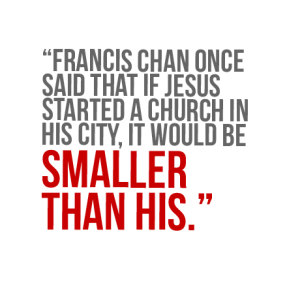
The Consumer-Driven Church
 Francis Chan, after preaching a particularly hard message, once said that if Jesus started a church in his city it would be smaller than his. He said it was a striking conviction.
Francis Chan, after preaching a particularly hard message, once said that if Jesus started a church in his city it would be smaller than his. He said it was a striking conviction.
I’ve always found Jesus’ reactions to many would-be followers peculiar. Having grown up in church, I’ve always been taught that one should be sensitive to people, to try and accommodate them, teach in the simplest and most understandable way, and “meet them where they’re at.” So it has always puzzled me when Jesus didn’t model this approach.
“As they were going along the road, someone said to him, “I will follow you wherever you go.” And Jesus said to him, “Foxes have holes, and birds of the air have nests, but the Son of Man has nowhere to lay his head.” To another he said, “Follow me.” But he said, “Lord, let me first go and bury my father.” And Jesus said to him, “Leave the dead to bury their own dead. But as for you, go and proclaim the kingdom of God.” Yet another said, “I will follow you, Lord, but let me first say farewell to those at my home.” Jesus said to him, “No one who puts his hand to the plow and looks back is fit for the kingdom of God.” (Luke 9:57-62)
Can you imagine a pastor today saying things like this? Can you imagine someone coming up in the altar call and saying, “I feel the Spirit moving on me to get saved and go into the mission field, so I’m going to go say goodbye to my family tonight and leave in the morning”, and the pastor replies, “Forget about them and go, there’s no looking back”? Or how about the same scenario except the convert wants to attend their father’s funeral, but the pastor says “Let the dead bury their own dead, you go”? Can you imagine it? How many of us would think that this pastor was unloving, too intense, or too inflexible?
Jesus gave no ground when it came to divided hearts. He consistently made it very clear that this would cost you everything, and that anything less would not actually be following Him. It’s a very different approach than the sales approach that so many churches (and people) take today.
What about keeping followers?
“After this many of his disciples turned back and no longer walked with him. So Jesus said to the Twelve, “Do you want to go away as well?” Simon Peter answered him, “Lord, to whom shall we go? You have the words of eternal life, and we have believed, and have come to know, that you are the Holy One of God.” Jesus answered them, “Did I not choose you, the Twelve?” (John 6:66-70)
Jesus seemed wholly unconcerned about the departure of many disciples. In fact He makes the point to the Twelve that He chose them, not vice versa. This was right after saying “All that the Father gives me will come to me” in v.37. He was wholly secure that God would bring Him those who were meant to follow.
So that leads me to ask why church leadership today is so concerned with numbers? Why are churches automatically assumed to be successful if they grow? Why are they assumed to be failing if they shrink? Did Jesus fail in John 6? Did he fail when he rejected those in Luke 9, or the rich young ruler in Mark 10? Did He fail when He intentionally spoke in a way that He knew they would not understand like in Matthew 13:10-17?
Are we judging church by what makes sense to us or to God?
At heart I have to think that some of this is about trust: they don’t resolve to preach Christ alone, abandoning reliance on persuasiveness, eloquence, and worldly intelligence (1 Cor 2). Why? Perhaps because they do not believe that simply preaching the Gospel is enough. Perhaps it is our natural (and sinful) tendency to take control away from God and into our hands. Could that not be the case when we put so much effort into make our churches modern or traditional based on what we think will attract and/or keep membership?
Perhaps the problem is with a misunderstanding of “meeting them where they’re at”. I believe there is a difference between appeasing, marketing, and loving. Appeasing happens when policies, practices, or philosophies change based on church membership’s discontent. Marketing happens when you’re trying to “sell” jesus and try to make it more accessible (sometimes under trendier words like “relevance”) instead of letting the Gospel sell itself to those who God has brought to Christ (John 6:37). Loving happens when you have mercy on their weaknesses and failings while gently teaching them the way to God (Romans 15:1-3).
It also seems that leaders are often too influenced by the average church-goers consumeristic tendencies.  After all, if someone doesn’t like some aspects of a church, then there is very little stopping them from hopping to another church down the road. As a result, leaders can easily fall for the temptation of making decisions that will keep people in the church rather than what is most God-honoring. The temptation gets even harder when the pastor truly loves the congregation.
After all, if someone doesn’t like some aspects of a church, then there is very little stopping them from hopping to another church down the road. As a result, leaders can easily fall for the temptation of making decisions that will keep people in the church rather than what is most God-honoring. The temptation gets even harder when the pastor truly loves the congregation.
Yet God did not call us to run Church, Inc. He called us to be a group of people who have put everything on the altar because we’ve seen that nowhere else can offer life (John 6:68). Perhaps we should be a bit less concerned with meeting them where they’re at (appeasing/marketing), and more focused on calling them to meet God where He’s at.


You are correct, it does cost us everything… What a small price for eternal extacy with Christ!! I praise him for allowing me to lose my life for his.